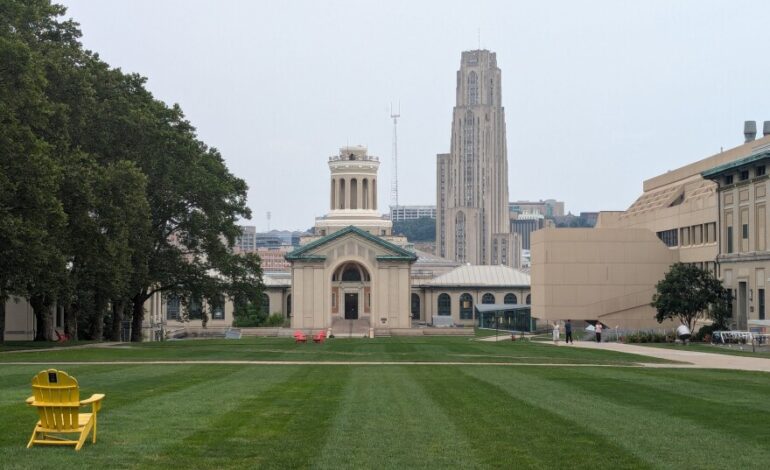Pittsburgh Colleges Assess Fallout from Federal Student Loan Changes

Colleges in Pittsburgh are currently evaluating the implications of a federal budget passed earlier this month, which introduces significant changes to student loan borrowing and repayment. The new law imposes stricter limits on federal borrowing, alters repayment programs, and seeks to hold institutions accountable for the student debt incurred by graduates.
Advocates for education have warned that these changes could severely impact borrowers and institutions alike. According to a blog post by the Institute for College Access and Success, the repercussions could last for generations. The organization stated, “Students, especially those from low-income backgrounds, will have fewer options to finance their education, in addition to potentially losing access to essential social safety net programs.”
Most of the law’s provisions will take effect next year. Graduate students will now be limited to borrowing a maximum of $20,500 annually, with an overall cap of $100,000, contrasting sharply with the previous ability to borrow the total cost of their programs. For parents assisting their children, borrowing limits will be capped at $65,000 per child, while total undergraduate and graduate loans will be restricted to $257,500 per individual. Data from the U.S. Department of Education indicates that the average debt for Pennsylvania college graduates was approximately $39,375 in 2020.
The anticipated changes may lead some students to explore alternative borrowing options, such as private loans. Diona Brown, the director of school services at the Pennsylvania Higher Education Assistance Agency (PHEAA), emphasized that more guidance is needed. However, she reassured that the federal changes are unlikely to affect their programs. “Existing borrowers and new borrowers will be subject to different limits and repayment plans, which could cause confusion,” Brown noted. She encouraged students to engage directly with their university financial aid offices for personalized guidance.
Marlin Collingwood, vice president of enrollment management at Point Park University, echoed Brown’s sentiment. He highlighted the importance of one-on-one communication, stating, “Call them, visit them, have a conversation. I think students are always surprised at how many options there are at most schools, from loans to private scholarships to merit scholarships.”
Brown also reminded students to complete the Free Application for Federal Student Aid (FAFSA) each year. The FAFSA will be available starting on October 1, serving as a critical step toward securing both state and federal aid.
Carnegie Mellon University (CMU) is still assessing the full impact of the new legislation. “We will be working to make sure talented and high-achieving students continue to have a pathway to attending CMU,” stated spokesperson Cassia Crogan. CMU has notably increased its undergraduate financial aid by over 86% from 2015 to 2024, reducing the percentage of students relying on federal loans from 52% to 28% during the same period, which has resulted in a nearly 30% reduction in total debt at graduation.
Community College of Allegheny County (CCAC) President Quentin Bullock expressed confidence that the new borrowing restrictions will have minimal impact on his students. He pointed out that very few students take out loans, with 88% of graduates leaving college debt-free. “This should have minimum impact on any of the programs that CCAC offers due to the mere fact of our affordability,” Bullock remarked.
The new legislation also mandates that institutions ensure their graduates earn more than individuals with only a high school diploma. Programs that fail to demonstrate this benefit may lose their eligibility for federal loans. Collingwood stated that Point Park has no concerns about their programs being targeted by this measure. “The goal of going to college should be to change the trajectory of your life,” he said. “And if you’re going to a college that’s providing you with a degree in a program that’s not gonna do that, then shame on that college.”
Additionally, a noteworthy change will allow students to utilize Pell Grants—awarded based on financial need and not requiring repayment—for short-term workforce training programs. Bullock indicated that this adjustment could enhance CCAC’s offerings, as the college collaborates with industries to create programs that meet workforce demands. He mentioned potential new courses in fields such as cybersecurity, information technology, culinary arts, and advanced manufacturing.
However, cuts to the Supplemental Nutrition Assistance Program could disproportionately affect students who rely on that support. Bullock noted that CCAC has food pantries available on all campuses to assist those in need. Looking ahead, he reported strong enrollment numbers, indicating a 16.5% increase compared to the previous year as of July 24, 2023.
As Pittsburgh colleges navigate these federal changes, the focus remains on ensuring that students have access to the resources and support necessary to succeed in their education and future careers.






